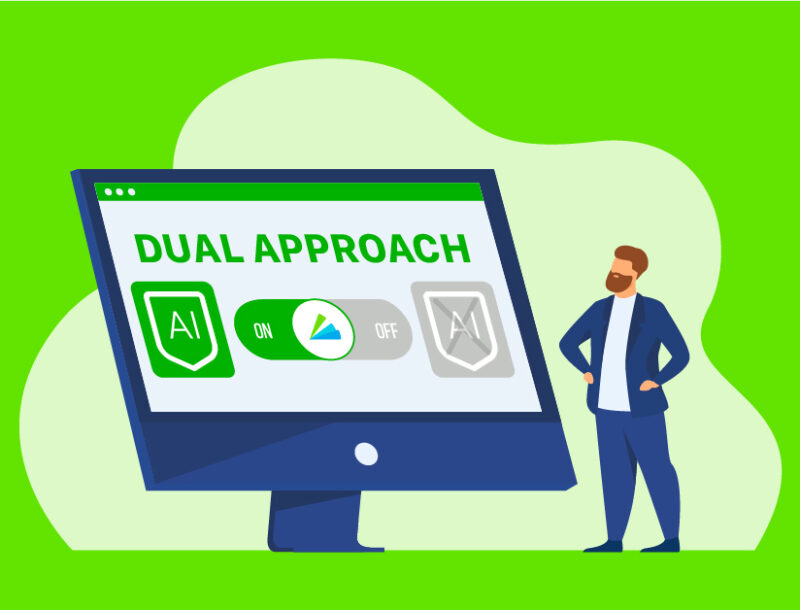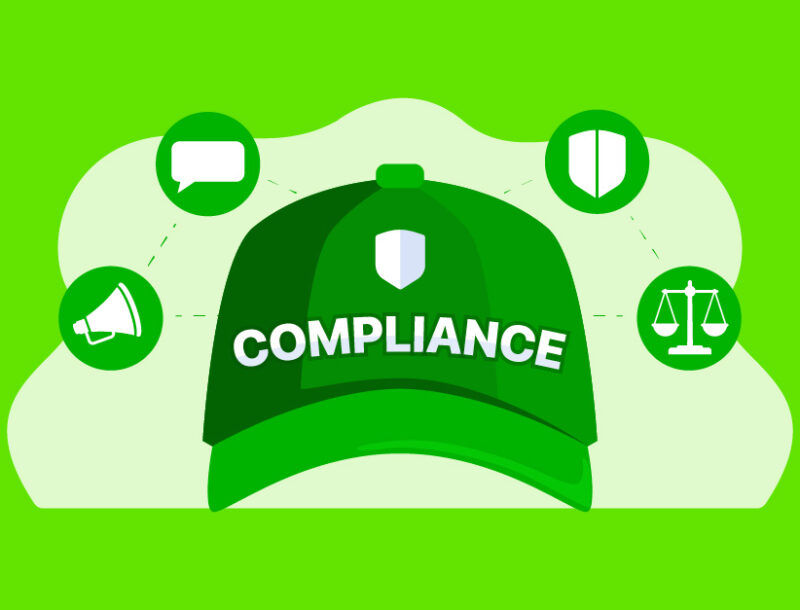Episode 10: Compliance Issues Report Pt. 1

Episode Description:
Today’s COMPLY Podcast episode is part one of a discussion between experts at PerformLine as they take a deep dive into the top marketing compliance issues thus far in 2022. Topics include:
- How we uncovered these findings using PerformLine’s proprietary Rulebooks and technology
- The all-too-common issue of third parties deceiving consumers through brand infringement (and these instances going unnoticed by the brand they’re infringing upon)
- The importance of substantiation when using subjecting language in marketing materials to protect both consumers and your organization
Show Notes:
- 2022 Top Marketing Compliance Issues Report: https://bit.ly/3y3ETE3
- The Top Marketing Compliance Issues and How to Avoid Them Webinar: https://bit.ly/3xFGfEF
- Follow Rhonda: https://www.linkedin.com/in/rhonda-mcgill/
- Follow Gianna: https://www.linkedin.com/in/gianna-barrere/
Subscribe to COMPLY: The Marketing Compliance Podcast
About COMPLY: The Marketing Compliance Podcast
The state of marketing compliance and regulation is evolving faster than ever, especially for those in the consumer finance space. On the COMPLY podcast, we sit down with the biggest names in marketing, compliance, regulations, and innovation as they share their playbooks to help you take your compliance practice to the next level.
Episode Transcript:
Ashley:
Welcome back COMPLY podcast listeners! Today’s podcast is part one of a discussion between experts at PerformLine as they take a deep dive into the top marketing compliance issues thus far in 2022. Topics include how we uncovered these findings using PerformLine’s proprietary Rulebooks and technology, the all-too-common issue of third parties deceiving consumers through brand infringement (and these instances going unnoticed by the brand they’re infringing upon) and the importance of substantiation when using subjecting language in marketing materials to protect both consumers and your organization. Thanks for listening and enjoy the show!
Gianna:
Our Top Market and Compliance Issues report uses proprietary data from the PerformLine platform to give insights into the top marketing compliance issues that consumer finance organizations are facing in today’s regulatory environment. The report takes a deep dive into each industry individually, but there were some common themes throughout that we’re gonna talk about today. But before we jump into the report, I wanna talk a little bit about PerformLine technology and rulebook that were essential to building out this report. So Sarah and Rhonda, do you wanna talk a little bit about what PerformLine lines rulebook are and how we use them to get this data?
Sarah:
Yeah, absolutely. So I’m happy to jump into that. So, for anyone who isn’t very familiar, essentially PerformLine rulebooks are compilations of language.Typically specific terms and phrases that can be possible compliance violations, depending upon the context in which they’re used. So for PerformLine’s rule categories we essentially have some very broad categories that will delve much further into in this report. And so for each of our clients, we’ll give them a combination of those slightly more broad categories, coupled with some slightly more industry specific rule categories. And so essentially what our tech is able to do is identify instances of that, you know, questionable language being found on your content, whether again, that be web call center, so on, so forth. I know here we’ll be focusing on a lot of the published content.
Sarah:
And so along with those more general categories, we will include the industry specific rule sets. However, for the purposes of this report, of course, we’ll be focusing on some of the more general trending language that can be applicable across the board. And so of course our rules and our rule book is not limited to only the PerformLine generated content. We do build out custom rules according to our client needs. But again for consistency’s sake a lot of the data here is looking at that more generalized language. And so in terms of kind of how we found these findings and what digging into that data looks like we analyzed data from our Remedi assets in the platform. So essentially you can think of a remediated asset as something where somebody confirmed that that was in fact, a true compliance violation and had some type of communication sent out to the source to remedy that language. So of course, you know, not every single instance of that questionable language might need to be fixed. And so to get to the, the heart of the trends in the issues and some of the content that we’ll be discussing today, we did limit that to ones that people essentially confirmed those issues were present. So again, these the data that we’re looking at was pulled across all industries focus on the most widely applicable trends. And as Gianna mentioned this was analyzed over a 12-month period.
Rhonda:
And just to add onto that one of the things that, you know, Sarah has done, which I think she’s done a wonderful job at just bringing to the, you know, to those highlights to us on a regular basis. So a recorder, when we have that chance to really look, we’re also also learning and that’s making our technology work a little bit, you know, smarter for us and for our clients. So I definitely believe that by diving into this data and Sarah has done an amazing job with that diving into this data has given us really, you know, a true view into what is really concerning our clients on a quarterly basis, so that we are able to bring on our new clients and really give them some expert thoughts as to you know, what we can do to help them to remediate some of the concerns that they have.
Gianna:
Awesome. Thank you both so much. So one of the most notable findings in this report is that the term payday was among the top most monitored and remediated terms across industries, including banking, fintechs, personal loans, and auto loans. It even made the list for UDAP as well. So Sarah, can you walk us through the context of how payday is used in these situations? And then Rhonda, can you talk to us about why it’s so important for organizations to be aware of this and how they can avoid potential regulatory scrutiny?
Sarah:
Absolutely. And Gianna this in particular is a great call out because it is so prevalent that, you know, especially eventually like when I was newer to the company, it blew my mind how common this type of infraction was. So just to give a little bit more background for everyone, one of our, you know, strongest rule categories that we have is geared around payday language. So typically these are things mentioning, payday loans, quick cash, easy payday, things that basically make a consumer—lead a consumer—to believe that they can receive a payday loan, which is very predatory, under a ton of scrutiny because ultimately it’s not uncommon for those types of loans to potentially harm consumers. And so a lot of our clients, you know, have to pay very close attention to when anybody known or unknown are making claims that your company can facilitate payday loans.
Sarah:
So this is something that we see all the time across, you know, the mortgage industry, buy now pay later, general consumer finance, anything that even remotely touches consumer finance in any way, shape or form. You’re very likely to have, unfortunately a frightening amount of kind of unknown third-party entities, trying to convince consumers to use their website, to access a payday loan through your business. So this is typically something, again, it’ll have language around click here for an easy payday loan. We’ll often see these pages incorporate your business’ name and they’ll even go so far as to include, you know, your accurate business address and like your accurate phone number. However, if you were to, let’s say you’re a consumer on that page, you see, you know, payday loans offered by whomever. You might see the business information listed there and assume that that’s, you know a, some type of viable indication that they are in fact partnered with that entity.
Sarah:
But if you were to go ahead and click on the majority of links present in that site, you would not be redirected to that corporate site. And instead you’re led to some usually suspicious website asking you for all of your very personal, sensitive information claiming to facilitate acquiring these payday loans. So again, this is something that we see across almost every single industry. It’s certainly got a lot of very, you know, strong reactions from our clients once we start surfacing these alerts for them, because people can be really creative when it turn, when it comes to convincing them that you’re offering these loans. So not only are we looking at brand infringement because somebody is posing to have some type of affiliation with your company, even though you may have no idea who owns the website. But again, kind of the bigger picture your business could be involved with luring people into getting this, this loan that might not be great for them. And I will pass it over to Rhonda at this point to expand.
Rhonda:
Well, I would just say that it didn’t surprise me, that we were seeing this term kind of surface as it’s one that a lot of our clients using probably the majority of our clients want monitored. What was some little bit of a surprise was the uptick over the last quarter, because it’s telling me that, you know, there may be some attempts by some marketers to drive leads. There may be attempts by, you know, various, you know, merchants to drive more business because you have to remember, we’re in kind of a strange market right now. And so when you look at the news and you hear about all of the impacts that are, you know, taking place on the businesses, those are a lot of the folks that we’re dealing with on a daily basis. So as business maybe slowing down a little let’s hope, things are about to turn around.
Rhonda:
So does the business for even the affiliate marketers who were typically driving business and driving leads over to some of the companies. So while many of them out there are reputable, I will definitely not say that everybody is a bad actor, but I will say that there are folks that are possibly going to use this opportunity to bend the rules a little bit and to be a little bit more riskier in doing whatever it takes to drive leads and generate leads. So this is a good time where I always tell our, you know, our clients to partner with their Client Success Managers, just to make sure that they’re covering their business and not falling into any traps of deceptive advertising at the hand of a third party. And then as I would also say that, you know, one of the things that I take a lot of fulfillment and pleasure in is that, you know, when we discover things like this, it’s the things that our clients don’t know that can create the most risk for their business.
Rhonda:
So it’s, you know, it’s always great when we’re able to bring these things to the surface because you can’t, as a business in this industry, always say that what you didn’t know at some point you’re gonna be held accountable for having to find a way to know. And so you hear more, you know, of the regulators talking about the importance of having a monitoring system in place and, you know, understanding what’s out there with your brand attached to it. And let’s just be real who wants their brand to, you know, be harmed because they’re just not in control of the marketing and the leads that are being driven to their company or potentially business that would be coming their way, going to a bad actor because they’re out here not doing the right thing. So I think that it’s, you know, it’s definitely two pronged that there’s opportunity around the board and I’m really pleased to see that we are able to discover and monitor and help our clients, in this space.
Rhonda:
So there’s a, like I said, there’s a lot of potential risks out there and the compliance risk is high because a lot of companies are working with smaller crews as well. We’ve seen a lot of layoffs and this compliance teams quite a few of them have been hit. So those individuals are, that are left behind, are being tasked to do a little bit more on a daily basis. So this is also an opportunity to just making sure that you’re rethinking of what you’re monitoring for, where you’re monitoring and how you’re monitoring, and just working really closely with your Client Success Manager here at PerformLine so that we can really, really help button down some of the areas that you could potentially miss out on.
Gianna:
Yeah, absolutely. And I will say that the, you know, the payday thing also surprised me just from my perspective, since I’m not on, you know, the Client Solutions team and I’m not as in the weeds with these terms, like you both are every day. It was just interesting. Cause that’s something I don’t think I ever would’ve thought of to even monitor for.
Rhonda:
Yeah. That’s just, and that’s just one of several!
Gianna:
Right.
Rhonda:
You know,
Gianna:
Exactly
Rhonda:
Several. So we always see these things pop-up and it, it, like I said, after a while, it doesn’t surprise you, but at the same time when certain things pop-up, you can almost kind of tell what’s ebbing and flowing within, within the industry.
Gianna:
Yeah, absolutely. So another common theme that we found across industries is that many of them had a lot of subjective terms that were flagged because they require substantiation. So these are terms like the best guaranteed, a hundred percent, lowest, et cetera. So can you both talk a little bit about this and why substantiation is critical with using these types of terms and your marketing materials?
Rhonda:
Keep in mind that we live in a time where there’s a lot of folks that are out there making a lot of claims out there. So every time you turn on your television, you open up your browser, you hear something that makes you do a double take. And sometimes all you can do is just shake your head. So imagine if you were shopping for a mortgage or a credit card or a personal loan, your everyday lender, you checked and they checked and you found that they had a claim that they had the best or the lowest rate, that would be pretty confusing. So you gotta trust that, you know, the reality is I should say, trust is at an all time low. And so you gotta make sure that your company is not a part of the problem. And that is the one thing that I, you know, continuously say to folks, don’t be a part of the problem, be a part of the solution.
Rhonda:
And so it’s important that you are taking an active stance and protecting your brand. So this is where monitoring what is being said about your product is critical. This is where making sure you have the right disclaimers, disclosures in place is ultimately critical because you don’t wanna be in that position of having to explain misleading claims, or anything that is, you know, potentially putting your business at risk to a regulator. So how can we, you know, help you to be better? And that’s what the whole process is all about. That’s what the monitoring, you know, process, that’s what the training of your employees about what to say and what not to say. There’s more folks that are out here trying to drum up business. So whether you’re in a mortgage company and your loan originators are out there trying to drum up business, you gotta make sure that you know, that they know what they can and cannot say so that your business is not put at risk. So like, I always tell people, you can’t say you’re number one and you can close the loan on the same day, if you don’t have the proof to back it up.
Sarah:
Absolutely.Those are awesome points, Rhonda. And one thing that I wanted to add in particular, you know, you mentioned trust is largely at an all time low because you have people all over the place making these types of claims. But one thing that I think is equally as important to remember is that there are, in some cases, individuals out there who maybe don’t have that awareness. And so whether that could be somebody who’s very young, who maybe they’re just kind of becoming of age or for whatever reason, just kind of being able to get into their own personal financing at this point, they may not necessarily always know to doubt those types of claims. And so that’s part of what especially this rule category in particular is geared to highlight so that companies can increase their vigilance of that.
Sarah:
So in terms of, you know, within PerformLine, when we say subjective language. Subjective at the definition is something that is really influenced, by opinions or feelings. So people try to use these, you know, these positive and very strong sounding adjectives to kind of lure people into using their services, you know, before one of their competitors. However, again, there’s always going to be that element of an individual’s interpretation of what that means as well. So in terms of how the interpretation can be a little bit in that gray area, especially comes around people claiming that they can offer affordable rates. When you have no idea of the budget or economic standing of every single individual who might be seeing your ads wherever they are, it’s pretty strong to, to say, “Hey, yep, you can totally afford our product.”
Sarah:
And then you may have a consumer saying, you know, finally, this is the first place that’s told me, “I can afford this.” Again, most people would have that that level of kind of suspicion or maybe reluctance to just take their word. But not everyone has that. And so you might wind up essentially convincing consumers to apply for a loan or to undergo that credit check or to try to acquire your services when it’s really not right for them. And then by the time they’ve gone through this entire process overall you may certainly not be affordable for them. And even if, you know, for whatever reason, you could wind up hurting that consumer’s financial health overall. And so anytime, you know, we see these clients or their partners or their affiliates, or whoever making these types of claims, we certainly want to highlight that to be sure that they are substantiating it.
Sarah:
So for example, when somebody claims they have the lowest rates in town, really to be able to say that and not, you know, touch the realm of UDAAP and that, you know, deceptive practices area, you really need to be able to say, yes, we have the lowest rates. Here’s a chart that compares some of our rates to our competitors. And you can independently verify that we do in fact have the lowest rates. So of course, very few companies, it’s not very simple to be able to put all of that information together, to synthesize it in such a way that shows true transparency and is also digestible and easily understood by your consumers. And so, you know, realistically we have a lot of people suggesting that there are partners or merchants or whoever, adjust that type of language to sound more theoretical or more like a possibility rather than a guarantee.
Sarah:
So again, the most popular offenders that we have in here are things, you know, we have hands down the most affordable rates. We will get you the lowest offers guaranteed. You know, we can, we can promise you we’ll get you the lowest rate. Things like that are certainly dangerous nowadays and should be handled accordingly. And then just one additional thing that I wanted to call out regarding kind of the PerformLine technology, is that we’re very much aware that, people can be very creative when it comes to this style of marketing. And so, we have designed our rulebooks such that they’re always customizable, always flexible. You know, you have the ability to go in and change your rules at any time. And so if, and when, you know, maybe you do come across a new, very creative variation of a suspicious sounding marketing tactic, you can go ahead and within, you know, seconds or a minute, you can go ahead and add that to your rulebook. So nothing that we have is set in stone forever. It’s going to be just as adaptable as your marketing material is. So just wanted to highlight that as well.
Rhonda:
I think it just basically highlights the, you know, how important it is to really consider the consumer protection piece. We’ve got a lot of consumers out here, like you said earlier, that just don’t know, and you don’t know what you don’t know. And so I think that it is important that every company takes a stance that it’s more than just closing the loan or making the deal or doing the buy now, pay laters or the auto financing or whatever it may be, whatever you do, but really consider how do you fit into the continuum of being a part of consumer protection. And it’s when you have technology that is allowing you to do some of the things that we’re able to do here at PerformLine. It is through that, that you are taking a stance in being a protector of the consumer. I look at us as more than just a technology company. I look at us as a part of that continuous continuum of consumer protection. I think that it just, really, it helps the client. It helps the consumer to just have that little bit of peace to know that someone is paying attention to try to prevent bad actors from coming into play and creating, you know, a bad situation for somebody who’s just trying to get themselves started, get themselves or them and their families started.
Ashley:
Thanks for listening to this episode of the COMPLY podcast! We hope you enjoyed the conversation between these PerformLine experts around the top marketing compliance issues we’ve seen thus far in 2022. To get the full report on Top Marketing Compliance Issues, be sure to check out today’s show notes and as always for the latest content on all things marketing compliance you can head to performline.com/resources. Thanks again for listening and we’ll see you next time!


